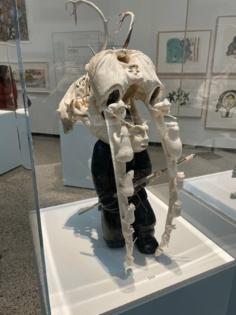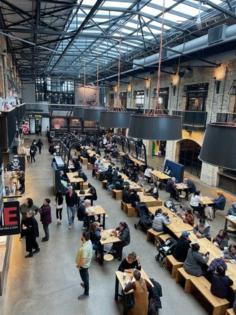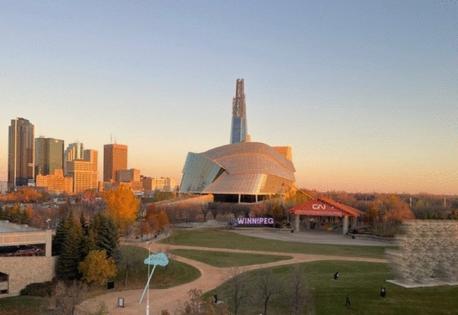World-Class Wandering in Winnipeg
By Lesley Frederikson
After landing in Winnipeg for a weekend visit and settling into our downtown hotel, my husband and I were hungry and ready to explore. Fortunately, we had unwittingly booked into a historic area that had plenty to offer.
The Forks sits at the confluence of the Red and Assiniboine rivers in the heart of the city and is home to museums, a theater, a hotel and many shops and restaurants. Thirty years ago the area was an abandoned railyard, and the building that now houses made-to-order foods from around the world was once its very spacious horse stable with tack rooms and haylofts above.
Stalls that housed animals used for moving goods to destinations inaccessible by train are now home to Asian, Mexican, Greek and Sri Lankan restaurants -- among many others. Busy chefs make steaming meals from their home countries for visitors who dine in a common area. I savored pancit from the Philippines while my husband dug into a juicy burger with a pile of delectably crispy fries. Other areas of the former stable have been made into galleries and gift shops where we stocked up on chocolates, wine and souvenirs.
In other buildings around The Forks we found more shops and galleries and a small park overlooking the two rivers. I could sense the gravity of this place that has gathered people together for more than 6,000 years. North America has long been called Turtle Island by Indigenous people, and Winnipeg, where these two rivers join, is considered its heart. It has been important to Anishinaabe, Cree, Oji-Cree, Dakota, Lakota and Metis people. Dene and Inuit also have ties to this area.
On a map where the Red and Assiniboine rivers meet, I finally made sense of the reference. Turtle Island holds Winnipeg at its heart. Florida and Baja California are its rear flippers and Alaska and Quebec-Newfoundland the front ones. Mexico is the turtle's tail and Nunavut, Canada, its head. Understanding these references was important to the rest of our Winnipeg visit because the Indigenous influences in this city are deeply respected and gently colored everything we saw and did.
With our hunger satisfied, my husband and I walked to the Canadian Museum for Human Rights that is located at the edge of The Forks area. We entered the deep, heavy, lowest level of this architectural masterpiece and wandered slowly through its galleries and marbled walkways up into the airy heights as we learned more about what constitutes human rights and how they have been violated throughout history -- some in ways about which I had previously been unaware.
Indigenous people were, of course, included in some of the darker periods of human rights abuses. From the weighty sadness, though, we continued to move higher through the museum into the light, and on the top floor we saw hopeful stories of those who have stood against human rights violations -- and won.
The next day found us steeped in Inuit art at the Winnipeg Art Gallery. Scattered throughout a vast room were carvings of whalebone, stone and walrus tusks near traditional clothing and drawings, none of which had descriptions on the walls near them -- just numbers. This unsettled me at first, but then it liberated me to see each piece for itself instead of what the curator dictated, and I found myself more deeply absorbing each piece.
Taking a rest on one of many sofas in the room, I found that each held a book describing the more than 400 pieces in the room. This uncommon way of describing the art made it sit with me in a new way that I found refreshing.
Other galleries housed more traditionally displayed paintings. Picasso's deconstructed take on Manet's Le dejeuner sur l'herb was a surprise and Marion Hooker's pastoral scenes serene, but it was this Inuit Sanaugangit exhibit that captivated me. Later we enjoyed a demonstration of Indigenous song and dance in the gallery's lobby near a three-story Visible Vault filled with thousands more Inuit carvings.
In the Manitoba Museum, we dug more deeply into the ways European traders impacted Canada when they came for the furs that were the beginning of the Hudson Bay Co. in 1668. We saw canoes and tools the traders used and learned that black lines on the famous Hudson Bay Co. blankets indicate the number of pelts that would be required to trade for each size.
In another huge gallery the museum proudly displays a replica of the Hudson Bay Co.'s first trading vessel, the Nonsuch. Built for the company's 300th anniversary in 1968, it sailed more than 8,000 miles before moving into its current home.
My favorite display, though, was through a single door that opened into a 1920 Winnipeg. Along re-created streets I peeked into a laundry shop, an apothecary, a boarding house, a theater and a publisher's office. Photos, mannequins and carefully displayed videos made the scenes come to life as if I were really walking down the sidewalk in a much younger Winnipeg.
Another gallery dipped even farther back in time to millions of years ago when northern Manitoba was under a tropical sea. This is truly a province with many layers, and the nuanced way in which they are embraced makes a return visit to learn more an absolute must.
----
WHEN YOU GO
Where to stay: Inn at the Forks, innforks.com
Get it arranged: Tauck Tours, tauck.com/tours/manitoba-polar-bear-tours
Art: wag.ca
History: manitobamuseum.ca
Humanity: humanrights.ca
Dining: theforks.com
=========
Lesley Frederikson is a freelance writer. To read features by other Creators Syndicate writers and cartoonists, visit the Creators Syndicate website at www.creators.com.
Copyright 2024 Creators Syndicate, Inc.



































Comments